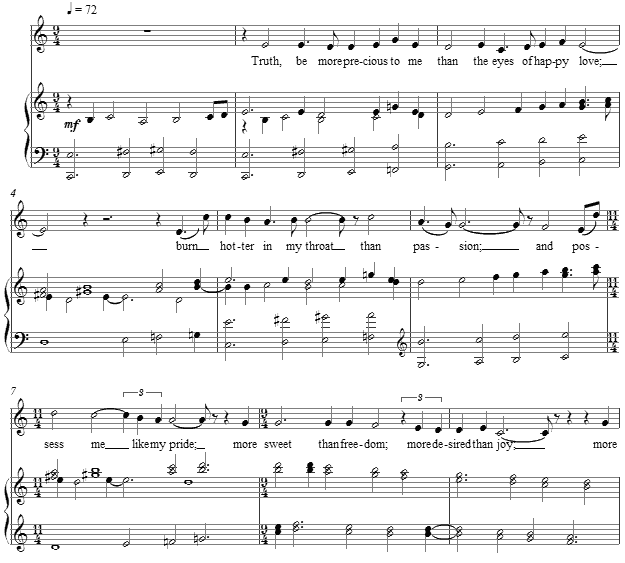Music and Texts of GARY BACHLUND
Vocal Music | Piano | Organ | Chamber Music | Orchestral | Articles and Commentary | Poems and Stories | Miscellany | FAQs
Invocation - (2010)
Max Eastman
for medium or low voice and piano
Truth, be more precious to me than the eyes
Of happy love; burn hotter in my throat
Than passion; and possess me like my pride;
More sweet than freedom; more desired than joy;
More sacred than the pleasing of a friend.[ 1 page, circa 1' 40" ]
Max Eastman
The text is found in Colors of Life (1918), a collection by Eastman from his mid-twenties. Max Forrester Eastman (1883-1969) was an American author and poet, who focused on politics and society: As a supporter of progressive causes in the early twentieth century, it is said that he "transformed" into a supporter of individual rights and became an opponent of socialism, and patron of the Harlem Renaissance. I find the notion that he somehow left the ideals of progress in society behind ludicrous. As this text alone shows, he sought truth.
A friend to Leon Trotsky early life, Eastman traveled to and knew the Soviet Union well. As with many Americans who first idealized socialism only to turn their backs upon seeing its collectivist state "transformation" -- a word I use exactly as those who would suggest Eastman was "transformed" away from socialism -- he saw truth. Just as German poet Erich Kurt Mühsam, the iconoclastic "Communist anarchist," was fully able to see, ideally a "liberation" of society from the state was the antithesis of the aggrandizement of centralized power in a state. I think therefore Eastman was not "transformed" into a supporter of the individual over the state, so much as a young man who dedicated himself (as in this "Invocation") to truth, and learned with first-hand experience that government grown too large and too powerful -- i.e., "transformed" -- becomes quite naturally and quite horribly an opponent of individuality. For this Eastman's life is a philosophic journey from editor of the socialist The Masses (1913) to the author of Reflections on the Failure of Socialism (1955). [ 1 ]
Did Eastman therefore change, or did the true nature of collectivist government reveal itself horribly to a seeker of truth. I suggest the later, as one may also from the detailed, scholarly work of Rudolph Rummel.
The long-lined meter and chorale-like voicing of the accompaniment is meant to echo liturgical chant. The accompaniment should be sonorous, such that the voice may express those emotions as the singer finds apt to each phrase, the rising sevenths heightening the rhetorical emphasis.
The score for Invocation is available as a free PDF download, though any major commercial performance or recording of the work is prohibited without prior arrangement with the composer. Click on the graphic below for this piano-vocal score.
NOTES
[ 1 ] "Why did the benign dream of Fourier and Owen, when made plausible by the rationalizations of Marx, and dynamic by the engineering genius of Lenin, turn into a nightmare? I think the reason, if you go to the depth of it, is single and very simple. It is because these men and all their tens of millions of followers, notwithstanding their bold scorn of superstition and firm determination to be realistic, had a naive and romantic conception of what a man is. Both the utopians and Karl Marx did their thinking before psychology as we know it, or anthropology, or even biology in its modern form, was born. And Lenin, as I said, did no theoretic thinking that passed beyond Karl Marx." p. 100, "Socialism and Human Nature," in Reflections on the Failure of Socialism, Max Eastman, New York, Devin-Adair Company, 1955.
Darkly, Eastman noted, "The worst enemy of human hope is not brute facts, but men of brains who will not face them."
I think this a more than apt observation. For this reason, I was led some years back to pen the poem, "I Shall Believe the Socialist."
Given that so many socialist leaders -- whether termed Communists, Marxists, Fascists, seemingly more benign Socialists, or any other party label -- have amassed to themselves and their elite supporters wealth and privilege far above the nations' ordinary citizens long ago proved to me by simple observation that "government" in all its forms becomes a road to said wealth and privilege, and that is what Eastman suggests lies at the root of the historical failures of socialism -- human nature.

